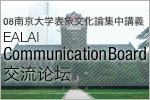Lectures
Winter term 2010 Theme lecture
Questioning the “place” for the generation of the classic: The classic of East Asia and the present

Time: 5. period on Friday (16:20-17:50)
Location: Building No. 1, Class room No. 120
Professor in charge: Ishii Tsuyoshi
Lecture contents
Lecture title
Questioning the "place" for the generation of the classic: The classic of East Asia
Theme of lecture
In what kind of places is the value of the "classic" found and accepted? In China's modern era Wang Guowei (1877-1927), one of those intellectuals who had mastered a classic intellectuality, argued that as a different artistic beauty in place of natural beauty there was the aesthetic value of the "things that are antique" and he said: "What we consider to be antique, is what we are actually doing from a place in the present". If that is the case, in which contexts has the classic been produced since the start of modernity in the different regions of East Asia? What are the actual contemporary conditions and environments where something antique and elegant would be considered to be valuable? Please keep this issue in mind and think about the significance the classics have for us in our daily lives, together with the specialists of four great universities of East Asia (Beijing University, Seoul National University, Vietnam National University, Hanoi school and the University of Tokyo).
Information on lecturers
Pham Van Khoai
Associate Professor at the University of Social Sciences and Humanities of the Vietnam National University, Hanoi. His field of expertise are the Vietnamese Chinese classics. Professor Pham has written on the transitions in the multi-layered relationship between the Chinese classics and the Vietnamese language in premodern Vietnam and in recent years has developed an interest in the significance attributed to the Confucian classics in the present. Works include "Issues of the Chinese classics in the 20th century" and "Confucius and the Analects" (both in Vietnamese).
Wang Shouchang
Professor at Beijing University. Since the 1980s he has been actively involved in practical activities coming from the center for the dissemination of traditional culture on a private basis, the "中国文化書院Chinese Culture Publishing House". Also, he is one of the editors of the journal "学人", which intellectually prepared the academic history and national studies movement in China in the 1990s. He is making critical observations about the positioning and the significance of the traditional intellectual culture in socialist China from the perspective of the practitioner.
Jo Gwanja
Professor at the Institute for Japanese Studies at Seoul National University. Works in Japanese include "Cultural interactions between Colonial Korea and Imperial Japan - Colonialism reiterating nationalism", (Yushisha, 2007). Professor Jo continues to investigate matters related to "knowledge" under the imperial rule and also argues about the revival of the classic on the Korean peninsula in the same time period. Also, in recent years she is interested in the issue of the "return to the classic" of the Japan romantic school, and seeks to win a comprehensive view of the cultural situation in the Imperial home country and the colonies.
Shinada Yoshikazu
Works include "The invention of the Manyoshu - The nation state and the classics as a cultural device" (Shinnyosha, 2001). His works have been translated into Chinese, and his questioning of the classics in East Asia's modernity has been disseminated throughout the East Asian region. His research is critically evaluating the recognition framework of modern Japanese literature and aims at the reformulation of enjoyment, which has become self-evident.
Tsutsui Kenji
Received his PhD in classical philology at the University of Frankfurt, Main. He has approached biblical studies and ancient Christian literature utilizing philological precision and has elicited important points for the argument about the formation process of the New Testament and other Christian classics. His works include "The Gnosis: the 'heretical ideas' of ancient Christianity" (Kodansha library Metier, 2004).
Mitsui Takashi
He is observing in parallel the language policies and movements in modern and contemporary Korea and the formation of the notion of the "Orient" in modern academism. Especially he is presenting a new framework about the real picture of language domination in Colonial Korea that differs from the previously established theories, and he has been receiving attention both in Japan's and South Korea's academia. He has published many research papers including "How was Japan's Oriental history formed? The history by Shiratori Kurakichi", "The Hangul movement in Colonial Korea and 'tradition' - 'Hunminjeongeum', Colonial power and "language movement history'".
Ishii Tsuyoshi
Coordinator of the theme lecture. Professor Ishii is conducting research on how the classicism which was at the roots of China's traditional knowledge changed during the influx of "philosophical" knowledge from the West, and furthermore is interested in how this classicism turned into the revolutionary ideas in the modern period. He is also conducting fieldwork about the recent Confucian revival movement in China.
Time of lecture and location
5. period on Friday, Building No. 1, Class room No. 120
Reminder about registration
As this course is made up of two elements, lectures and seminars, the active participation of all students taking the course is expected. Also, for this reason, if there are more than 30 students who want to take the course, participants might be decided by a drawing.
Schedule (tentative)
-
Session 1 (October 15) Guidance Session 2 (October 22) Vietnam (1) Lecture, Pham Van Khoai Session 3 (October 29) Vietnam (2) Lecture, Pham Van Khoai Session 4 (November 5) Japan (1) Lecture, Shinada Yoshikazu Session 5 (November 12) Japan (2) Seminar, Shinada Yoshikazu Session 6 (November 19) Western classicism (1) Lecture, Tsutsui Kenji Session 7 (November 26) Western classicism (2) Seminar, Tsutsui Kenji Session 8 (December 3) China (1) Lecture, Wang Shouchang Session 9 (December 10) China (2) Seminar, Ishii Tsuyoshi Session 10 (December 17) South Korea (1) Lecture, Jo Gwanja Session 11 (January 21) South Korea (2) Seminar, Mitsui Takashi Session 12 (January 26) Concluding discussion


